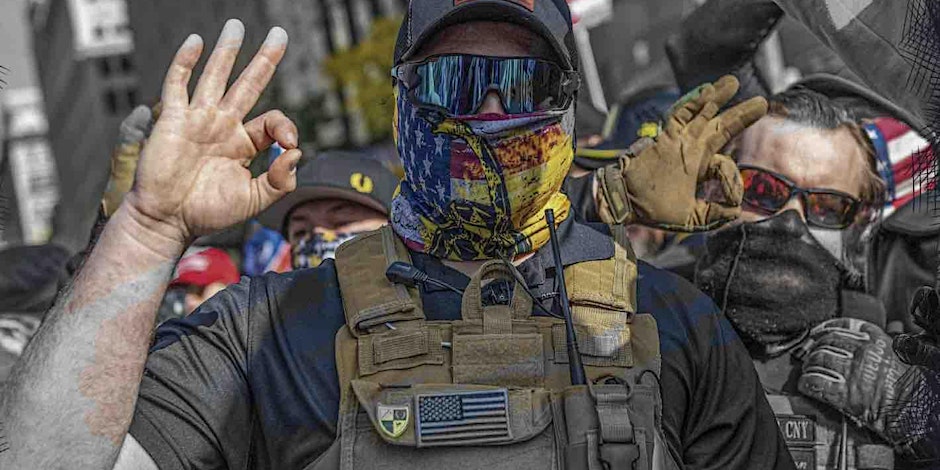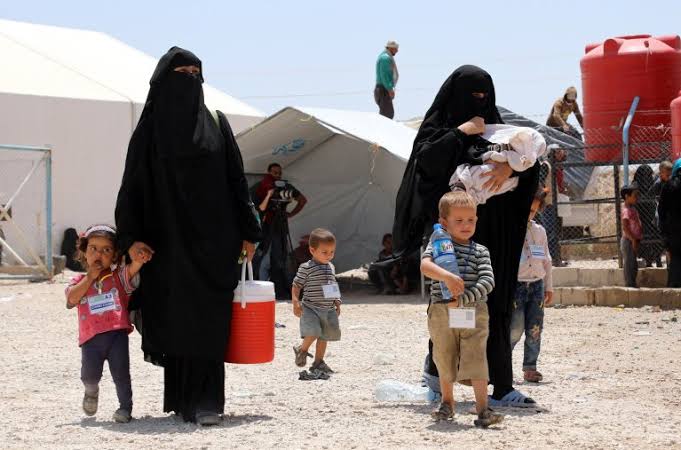Anne Speckhard & Sophia AbiNajm Download PDF Introduction Targeted violence and violent extremism are on…
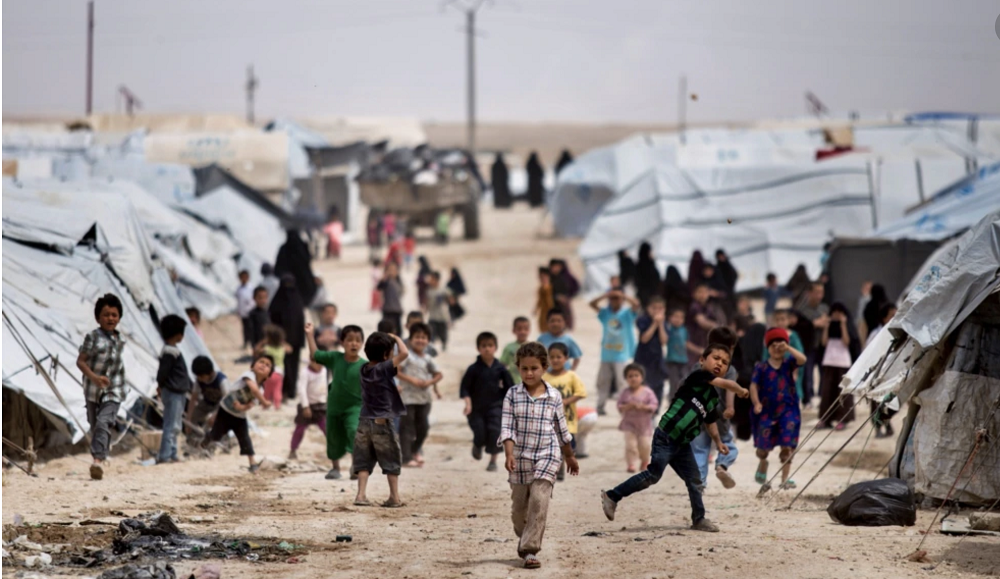
“Ransom for Freeing Captives”: ISIS-Linked Transnational Networks Formalize their Priority of Freeing ISIS Loyalists from Syrian Prison Camps
“Ransom for Freeing Captives”: ISIS-Linked Transnational Networks Formalize their Priority of Freeing ISIS Loyalists from Syrian Prison Camps
Mona Thakkar & Anne Speckhard
While Western countries in particular still debate about the return of women and children detained under SDF authority in camps in N.E. Syria, with many Europeans making a push to take those who now disavow ISIS home, before Turks invade the area, geopolitical forces are hard at work pushing some detainees and their supporters to escape from rather simply to survive in camps and prisons in which they are currently held. On the one side, Turkey is sabre rattling from the north preparing for another Turkish-backed invasion of NE Syria with Turkey already engaging in missile attacks aimed at assassinating the Kurdish leadership of the Syrian Democratic Forces (SDF) a group that fought ISIS with U.S. backing but who Turkey claims as part of the PKK terrorist group. Meanwhile, inside the camps, pro-ISIS women who have consistently had the most access to funds that arrive through informal hawala systems are busy recruiting youth taken into Syria who is now ageing into teens with small gifts and lavishing attention, which is then used to entice these teens to rebel against their anti-ISIS mothers, declare them apostate and ready themselves to escape to join ISIS. Young boys in the camps in the particular face growing pressure as they face the dire fate of once they reach puberty, based simply on their gender and age, being separated from their mothers in the camps and taken to SDF prisons for adolescent teens where they then can age into adult male prisons.
In recent months ICSVE has learned by monitoring pro-ISIS Telegram and social media accounts that there has been a direct and strong change in pro-ISIS support networks and crowdfunding campaigns to offer financial support to ISIS detainees held in Syria. Gone are the days, when the ISIS-linked fundraisers were only dedicated and interested in providing relief assistance for women and their children living in appalling conditions in the detention camps of northeastern Syria. Instead, their collective energies from distant geographies are now increasingly directed toward freeing individuals sympathetic to ISIS from camps and prisons in Syria, rather than helping them to survive inside the camps. A new alarming trend tied to these crowdfunding campaigns for ISIS detainees suggests that synergized international crowdfunding efforts are underway to free foreign ISIS minors from these camps in the wake of the increasing wave of repatriations and the SDF practice of removing young boys who reach adolescence from the camps to be placed in youth prisons where rehabilitation efforts are underway. With, the recent speedy repatriations of children and women from Al-Hol and Al Roj, undertaken by Belgium France and Russia in the last two months of June and July, and with other countries preparing to do the same, there has been a heightened urgency on part of the ISIS-linked financial networks to work collectively, even from distant geographies, to make a list ditch effort for soliciting funds for smuggling the foreign ISIS minors out of the Al-Hol camp on a priority basis. Youth, in particular, are targeted for escapes, to take adolescent boys who are about to face prison who can instead replenish the ranks of ISIS fighters and the teen girls who can serve as brides for the fighters.
Newly formed German Tajik and Russian pro-ISIS networks ICSVE has been monitoring are, for instance, changing course from supporting pro-ISIS women in the camps and now instead joining hands in smuggling out their loyalist detainees. We see, for example, how one woman from the camps pleads for help of this type–escape–rather than support inside the camps, “Many families in our camps need freedom more than food and clothing! How many suffer from constant persecution and oppression by godless atheists who have no way out? How many wanted and wandered from one sector of the camp to another in an attempt to hide from the prowling military! How many wounded need diagnostics and high-quality treatment or surgery? How many mothers of big boys, every night afraid that they will come and take their sons to their schools so that later make them the enemies of their religion? You can rumble about the position of all the sisters and children for a long time, but the essence is the same – freedom is paramount”. These words sum up the entire picture of this study that focuses on our assessment of the changes witnessed in recent crowdfunding campaigns undertaken by pro-ISIS entities for buying the “freedom” of imprisoned and detained ISIS individuals in Syria with some interesting revelations about the social and digital matrix in which their financial operations thrive.
One case in particular discovered in July highlights these crowdfunding efforts undertaken by Russian, German and Tajik-speaking pro-ISIS networks for raising $17,000 for smuggling out two Tajik ISIS minors from the Al-Hol camp on July 24— after Tajikistan, one of the countries actively favouring the return of its ISIS-linked nationals and that has also provided amnesty for its former ISIS fighters— recently in end of July repatriated, around 100 children and 42 women from the camps in northeastern Syria. As many countries now make the tough but urgent decision, in the face of impending Turkish aggressions in the area, to bring home their ISIS families, the ISIS-related financial networks made it imperative to raise funds for getting children out of the camp seeing this counter move as the last golden opportunity from preventing the return of their youth to the “disbelieving lands” and as a very quick way to forge them into future extremists.
Consequently, on July 24, a staunch pro-ISIS Russian network named “And it is our duty to help the Believers” shared the emotive plea of Umm Hamza, a fugitive pro-ISIS Tajik woman from Al-Hol. In a long written text, Umm Hamza pleaded with ISIS supporters to raise funds of $17,000 for freeing her two Tajik children out of the camp out of which she had already smuggled herself. Other interesting claims made were that the relatives of these children back in Tajikistan – aware of the Tajik woman’s stern decision of not allowing the repatriation of these minors–pushed an immediate demand for the return of the minors with Tajikistan’s government. For identifying these children in the camps– the post claims– relatives submitted the photos and other identity proofs to the official authorities in Tajikistan for ensuring their return. The pro-ISIS Tajik mother who escaped from Al-Hol purportedly asked the other Tajik women under whose guardianship her children are in the camps to conceal her children’s identities to delay the prospect of the reparation of her children.
In this context, it is also interesting to know that apart from their children, female ISIS loyalists have attempted to obstruct the repatriation of foreign orphan minors. This happened in the case of an Albanian preteen, Eva Dumani, who ICSVE was helping to repatriate. She was threatened and hidden from her country authorities in Camp al Hol by pro-ISIS women when Albanians came to take her home and she missed her opportunity as a result. Similarly, Aminah Mohamed, the orphaned American daughter of Ariel Bradley, was hidden from authorities in the camps by pro-ISIS women and even made to wear a niqab at age 8, and was only rescued after the SDF mounted a military operation in the camps to bring her home. The fact that Western countries who have been accelerating repatriations of late are also following the practice of asking ISIS mothers in the camps if they even want to be repatriated and leaving the decision up to them raises a very thorny question about the rights of their children who are not given their own choice as well as concerning the responsibilities of home countries to protect their minor children from maternal abuse. It could easily be argued that any pro-ISIS mother that chooses for her child to stay in the camps, perhaps in hopes of rejoining ISIS, rather than be repatriated, should be viewed by the home country as non-protective, neglecting the good of her child, and even abusive in making such a decision for the child. If the child were at home, the state would intervene in such circumstances and likely remove the child from her to act protectively on behalf of the minor despite the mother’s wishes to the contrary. In these cases, ICSVE has consistently argued that maternal rights need to be temporarily suspended by the home country and the children removed and repatriated despite their mother’s wishes to the contrary, especially in the case of her wish to stay behind and continue to root for the revival of ISIS. This was argued by ICSVE in the case of American Samantha el Hassani, that her children should be taken back to the U.S. whether or not she wished to return herself, and that has already taken two of her children into ISIS she could legitimately be viewed as an abusive mother and have her parental rights temporarily suspended while the U.S. authorities worked on behalf of bringing her children home to the safety and freedom they deserved. The pro-ISIS women see it differently, however, viewing their children, and even those of the non-ISIS supporting women, as useful fodder for the fight. Orphan children have for instance been utilized by pro-ISIS women in the camps to garner more sympathy and solicit more donations from ISIS supporter communities. This observation is supported by the claims of many anti-ISIS Russian women who reiterated on social media that “they [pro-ISIS women] use orphans for funding and there were orphans whom we barely won back from one supporter of ISIS who was sent to Russia. Psychologists worked a lot with them so that they would come to their senses. These loyalists [ISIS supporters] frightened those around them that brothers [ISIS militants] would come and cut off their heads, etc. this is the upbringing of the ISIS loyalists they train them [the children] like animals.”
Umm Hamza, the mother of the Tajik minors left in al Hol for future smuggling out of the camp, rumbles how she and a handful of other Tajik women, a few days back, had successfully exited from Al-Hol to safely reach Atma, in the HTS held province of Idlib. And now she also wanted her children to be smuggled out as soon as possible so that they can accompany her to a “safe location”. It is widely known that Idlib has been the favourite destination for pro-ISIS female fugitives in Syria. Many foreign women who are smuggled out of the camp continue to anonymously lead their lives in Idlib province free to serve the militant jihadist cause while eluding justice, with some European women even chronicling their daily life on social media.
Umm Hamza’s call for help ends with the acknowledgement that the same Russian ISIS network named “It is our duty to help the Believers ” had already helped her raise $7000 for her 17-year-old elder son. And now through a new crowdfunding campaign, she hopes to raise another 7000 dollars for her younger son so that they both can be smuggled out together from Al-Hol. Hence we see how the ISIS financial networks have moved from simply supporting pro-ISIS women and children inside the camps and beginning to now dedicate their efforts to mobilizing maximum financial assistance for older children in particular to be smuggled out to militant jihadists groups. In the case of these Tajik children, the fear among the pro-ISIS cohort of women is that these children can be caught and immediately repatriated in the wake of recurrent sweeping raids and search operations conducted by the Kurdish security forces, the Asayish, to search them or, if they remain in the camps, they will be taken from their mothers to the adolescent prison and put in in rehabilitation programs that may turn them against ISIS ideology.

In the above image, Russian-linked financial networks have posted the advertisement of raising smuggling capital of $17000 for two teenage Tajik boys for smuggling them out of Al-Hol.
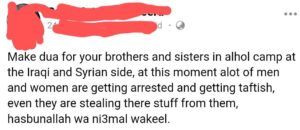
A woman from the Muhajirat section of the camp reflects on the tightened security measures undertaken by SDF in the wake of the increasing incidents of violence in Al-Hol
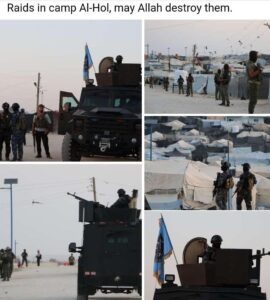
Apart from this, while this fundraiser for smuggling out the two Tajik minors was primarily spearheaded by the Russian group, “It is our duty to help the Believers” where the channel administrator posted regular updates about the progress of the money collection efforts, the plea was also aggressively circulated in 6 other Russian ISIS-linked crowdfunding Telegram channels with more than two thousand subscribers to diversify and expand the campaign’s outreach helping them collectively raise nearly $2000 on the first day of the fundraiser. Encouraging other supporters to even contribute 10 rubles, the message shared by the administrator was “Brothers and sisters, Praise be to Allah, many, many, this is such a sign for us. “Only yesterday we opened the collection, and in one day we collected $ 2190 الحمد لله رب العالمين. It is the mercy of Allah to us that the news reaches us about these camps and we can participate in them, and let no one think how 10 rubles will help there.” Likewise on August 1, the Russian ISIS-linked channel “And it is a duty to help the Believers” acknowledged that their aggressive crowdfunding campaigns yielded successful results as they expeditiously collected $6,300 within a span of another 5 days.
Meanwhile another Russian ISIS-linked Telegram channel “Invitation to heaven” also aimed to collect another $7000 for the two Tajik minors. This channel actively shared other messages and the progress reports of the monetary collection efforts from the “It is our duty to help the Believers” channel to bolster its funding campaign for Tajik teenage boys by successfully raising $1000 in a single day. Some ISIS supporters doubted the legitimacy of these fundraisers as two parallel fundraisers were running for a similar cause – the freeing of Tajik teenagers from Al-Hol. Fearing that this confusion would demur others from contributing financially, the administrators of both these Russian ISIS-linked Telegram channels made it clear that, though the money collections campaigns are different, they are dedicated to the same cause and it doesn’t matter to whom the ISIS sympathizers decide to funnel their funds to. This alluded to the fact that the Russian ISIS-linked networks had divided the responsibility of raising the funds considering the huge amount they needed to raise $14,000. Meanwhile, other Russian channels that cross-shared this fundraiser appeal also encouraged their subscribers to give “Sadaqah”, i.e. charity, for this crowdfunding campaign by regularly sharing the money collection updates of both the above-mentioned channels to help them quickly raise funds in the minimum duration of time.
Interestingly, to amplify the impact of this fundraiser and also garner more funds from central Asia, particularly Tajikistan, the Russian ISIS network ” It is our Duty to Help Believers” and “Invitation to Heaven” channels appear to have collaborated with the Tajik financial network of the Islamic State of Khorasan province (ISKP) in Afghanistan known as ”Devotion and Loyalty”. This channel has reflected on its official ties to the ISKP by claiming that “this charity channel was officially opened by the brothers of Khorasan province for the captives of mujahideen brothers and sisters”. This Tajik language ISIS financial network “Devotion and Loyalty” predominantly raise funds for ISIS families in Afghanistan as well as for Tajik families in Syrian detention camps and is linked to the “Protectors of the Ummat” group an informal ISKP recruiting group on Telegram, where the administrators of the group widely circulated the plea urging the supporters on the Telegram group for giving charity for freeing the two Tajik minors discussing the payments and threatening people with violence who failed to financially support them. Back in May 2022 the Tajik ISKP network “Devotion and Loyalty” administrators in collaboration with a Russian ISIS network ” Invitation to Heaven” were instrumental in collectively raising handsome donations of around $4000 in 10 days earmarked for building a religious school for the children of ISKP fighters, $2500 as Zakat for the ISKP militants in Afghanistan, and $200 for animal slaughter for Aqiqah- an Islamic tradition of sacrificing an animal on the occasion of a child’s birth. This collaboration demonstrated that the money collected through the coordinated Russian Tajik crowdfunded campaigns reached ISKP fighters to bankroll its activities and operations in Afghanistan.
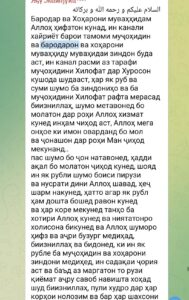
Tajik ISIS network “Devotion and Loyalty” alludes to its official ties with ISKP fighters in Afghanistan by saying “Brothers and Sisters of Muwahhid, may God protect you, this charity channel is for all Mujahideen and Mujahideen brothers and sisters in prison, this channel was officially opened by the Mujahideen of the Khilafat in Khorasan, every ruble and sum of your money goes to the prisoners and the Mujahideen of the Khilafat”.

The Tajik Islamic State of Khorasan province network acknowledges that in unison with the Russian ISIS crowdfunding network “Invitation to Heaven ” they raised handsome funds worth thousands of dollars for the ISIS militants in Afghanistan.
The crowdfunding money collected through the anonymous and highly secure payment system of QIWI wallets can be illicitly funneled in Afghanistan through unregistered informal hawala networks and cash couriers that have been the most favoured method for sending funds for ISKP in Afghanistan as owing to the limited reach of commercial banks in Afghanistan, these informal hawala transfer systems, serve as the everyday mechanism for sending money around Afghanistan and abroad just as they also do in Syria. As ISIS detainees explained to ICSVE, any money that reaches Turkey is essentially already accessible in Syria via hawala networks. The January 2022 UN ISIL (Daesh) and Al-Qaida Analytical Support and Sanctions Monitoring Team also substantiate these findings highlighting how an international financial facilitator for ISKP in Afghanistan Ismatullah Khalozai through his Turkey-based hawala business transferred $ 87,000 to finance ISIS-K operations. In July 2022 UN ISIL (Daesh) and Al-Qaida Analytical Support and Sanctions Monitoring Team report also further elucidating this dynamic as ISKP –through IS’s Al Karrar revenue office in Somalia— received money through cash couriers via Yemen to arrive in Afghanistan. As the ISKP official Al-Azaim media and its decentralized media propaganda ecosystem are heavily focused on producing, and disseminating their propaganda content in central Asian languages aimed at attracting and recruiting ethnic Tajik and Uzbek speaking fighters from Afghanistan and Central Asia into their ranks-particularly calling upon the Tajiks to fulfil the Islamic obligation of emigrating and waging jihad against enemies in Afghanistan– there also lies a possibility that these foreign fighters from neighbouring countries bordering Afghanistan, eager to join ISKP could also serve as conduits for bringing cash flows upon their arrival in Afghanistan for the ISKP with the possibility that these funds could be also diverted to Syria for the escapes of ISIS women and teens. It’s not only just the money that has been laundered, there has also been sound evidence of various human smugglers enterprises involved in facilitating the movement of ISIS fighters in various conflict theatres with the latest case of an ISKP militant, Mohammed Ayoub aka Hanzalehn apprehended in Afghanistan by Taliban’s General directorate of intelligence for fundraising for ISKP in Afghanistan, supplying weapons and enabling the migration of ISKP fighters from Afghanistan to Turkey via Iran. This study points to how the increasing focus of ISIS-linked financial facilitators for crowdfunding money for freeing out minors, women and even male ISIS fighters will fuel the proliferation of human smuggling enterprises in Syria and elsewhere continuing the human smuggling business as a lucrative practice in the future.
Already trading off their expanded outreach for their digital security, with a greater social media visibility – acting like an Achilles heel – for these ISIS-linked financial networks– it was observed that the payments for these crowdfunding campaigns were strictly only accepted through the Russian electronic wallet payment system of QIWI. The digital payment Russian gateway offers users a wide range of payment methods with the possibility of funds being deposited conveniently to the recipient’s electronic wallet via thousands of QIWI Terminals— widespread in Russia and the other Commonwealth of Independent States (CIS) phone stores, ATMs or via Digital QIWI wallets accessed on smartphones with the QIWI cash appearing on the recipient account instantly. Apart from this, it is also the most preferred payment system for illicit entities as these digital QIWI Wallets can be easily replenished from the QIWI app, website or through widespread QIWI terminals with cash in rubles and other local currencies coupled with instant withdrawal from Visa QIWI Wallet to owner’s bank accounts and cards or other money transfer systems. To combat the menace of money laundering that fueled illicit funding to the terror outfits like ISIS-abetted by their widespread use of such highly secured- online E-wallets, the Russian government in August 2020 imposed a ban on all anonymous cash deposits on electronic wallets, making it obligatory to make top-ups with bank transfers. This legislation required them to identify themselves by linking their bank accounts to their electronic wallets enabling the authorities to trace the source origin of funds. But as is evident, these legislations to curb the tentacles of terror financing have not deterred independent Russian financial networks from raising funds for ISIS individuals. The contact numbers linked to QIWI wallets that were used for raising money were registered with Megaphone, Skartel Lota, and Mobile TeleSystems ( MTS) operating from Moscow, Leningrad, and the Republic of Dagestan respectively, suggesting that all of the financial operations could have been potentially run from Russia. This was done to trace the origin of funds as QIWI is providing its services in Russia, Kazakhstan, Moldova, Belarus, Romania, United Arab Emirates (UAE), Uzbekistan, and Tajikistan amongst others. The tracked QIWI Wallet numbers suggested that the owners of the account could have been using these telecom operators for a considerable duration of time suggesting that these numbers could be the working contacts of the administrators of these ISIS-linked crowdfunding networks.
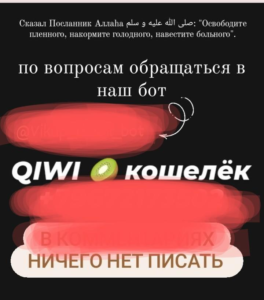
The Russian ISIS-linked network appeals to the donors to send funds to their QIWI wallets.
While raising funds for smuggling out ISIS minors, ISKP Tajik Telegram channel “Devotion and Loyalty” recirculated a video tutorial offering a step-by-step guide – exclusively for its Russian target base -about transferring money effortlessly from Russia’s largest Sberbank to the digital QIWI Wallets. But ultimately the large stream of illicit and suspicious donations creeping into the Tajik channel’s provided digital QIWI Wallet number led to immediate suspension of their accounts and the resultant loss of all donations’ alarming other interconnected Russian-linked financial networks to morph themselves with new names for their networks and redirecting donations to new accounts to keep the money flowing. Out of the 4 Russian networks involved, every channel receiving donation requests provided at least 2 different QIWI account wallets as a strategy of diversifying and obscuring the increasing flow of anonymous donations required for raising $17,000. The Russian and the Tajik organizers in a bid to implore more Muslims to do their bit insisted that if they cannot fulfil the important Islamic obligation of freeing the Muslim captives, they could give the money in the form of debt, thus, pushing the dubious claims of the Tajik mother who promised to “return the debt as soon as her sons are out of the prison.”. This narrative of “giving “Sadaqah” (charity) in the form of debt is employed to coax the supporters to translate their empty words of assurance, and feelings of pity and empathy for these women into immediate action by rapidly providing them with urgent financial assistance, hopefully, without expecting anything in return.
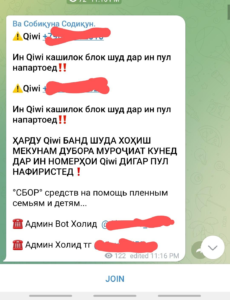
ISKP-linked Tajik channels caution the followers to refrain from sending fund transfers to the newly blocked Qiwi wallet as any further transactions to the account will attract the scrutiny of banking authorities/intelligence agencies.

A step-by-step video tutorial explaining the safest ways to transfer money from Russia’s largest SBER Bank to QIWI Wallets exclusively for the Russian target base- on the Tajik ISKP network “Devotion and Loyalty”.

Here the German ISIS-linked channel “Spend in the way of Allah” circulates the plea of raising funds for two young teenage boys from Al- Hol- characterizing them as ” two young healthy lions” that will be instrumental in uplifting the ” Ummah” (whole Muslim world), while withholding information of their Tajik nationality, providing the donors with a buffet of money transfer options for receiving funds.
The Russian and Tajik ISIS-linked channels were more transparent in giving details about the individuals that needed to be smuggled out when juxtaposed with ISIS-linked German channels that withheld information on the nationality of the Tajik minors citing “security concerns”, ostensibly knowing that they would get a pale response from the target audience- Muslims in Europe. This phenomenon has been discussed in detail in “the trends of crowd campaigns for ISIS women ” study that accentuates how factors like ethnicity, nationality, language, affiliation, and ideological orientations have been highly influential in driving ISIS supporters’ decisions of providing financial help for the women in the camps. On July 24, two German ISIS-linked channels “Sisters in Tent” and ”Spend in the way of Allah” unitedly posted a long distressing “SOS” text that called upon the supporters for aiding the escape of 2 “lions of Ummah” (i.e. the Tajik minors) for which they claimed $7000 needed to be urgently raised. The information shared on the German channels was similar to that of the appeals posted on the Russian and Tajik ISIS-linked channels – but falsely implied that the funds were raised for the escape of children of German ISIS women. Contrary to Russian and Tajik channels that treaded with utmost caution in terms of accepting payments from other modes of transfers, solely depending on their lifeline- QIWI, the German channels promoting the fundraiser offered a brazen buffet of diverse payment options for their subscribers that included RIA Transfer, Bitcoin, Money Gram, Western Union, direct bank transfers and other cryptocurrencies like Tether (USDT), a stablecoin, known to be less volatile than other cryptocurrencies, as it is tied to real-world assets and the US dollar for maintaining its stable value.
Without paying heed to enviable repercussions for financing terrorism, one of the German ISIS financial networks ” Spend in the way of Allah”, while giving the recipient bank details to their followers, ostensibly exposed the trail of illicit money departing from Germany to Syria. For facilitating international donations of around $500 the money was to be transferred to the beneficiary ‘Kujtim Bunjaku’s savings account opened with C24 gmbh bank in Frankfurt am Main. C24 bank was opened in 2020 as an initiative of the Munich-based Check 24, the largest comparison portal in Germany providing price comparisons for various financial products in the areas of insurance telecommunication, travel etc. This is just one of the thousands of examples demonstrating how Germany’s financial ecosystem has provided breathing space for ISIS financial intermediaries to exploit the loopholes of the country’s banking system to openly move funds with ease from Germany to Syria without fearing the repercussions of terrorism financing. The support provided by the German ISIS networks is not limited to the women in Syrian detention camps but also to those who are convicted and arrested in Germany for their membership with ISIS. Another German network channel on Telegram “Free our Sisters” in unison with ” Rayat Al-Tawhid” and ” Al Asra” ISIS networks helped raised back in February 2022 legal fees of around $11,000 in instalments for bailing out a Russian ISIS member from Dagestan province detained in Berlin, awaiting his repatriation to Russia. The donations were accepted through the crowdfunding site ” PayPal Generosity Networks” with funds being transferred direc y to the beneficiary Hakan Dündar’s PayPal account. The account still has not been reported or taken down by PayPal for sponsoring terror financing.
Usually accepting funds by giving bank transfer details of individuals is a risky gamble as it has a greater potential of blowing the lid off the individual’s identity revealing sensitive information about the ISIS linked financial facilitators and making it easier for intelligence and law enforcement to track them down. In such cases, laundering money for financing ISIS detainees through Islamic charitable organizations provides them with the cover of anonymity and also eases the process of laundering money to the internment camps in Syria. For example, in ICSVE’s previous research reports, it was exposed how the funds for building a mosque were covertly diverted for the cause of ISIS detainees in Syria. But here it is discernible how the efforts for soliciting donations for ISIS detainees are no longer subtle or operating behind closed doors, and rather perceptible in the form of appeals for donations being posted on open channels on Telegram offering myriad payment options for fund transfers that have the potential of exposing the ISIS financier’s identity.
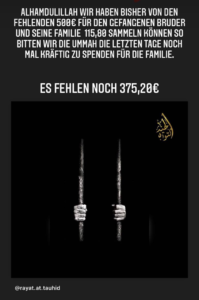
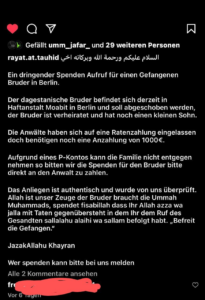
German ISIS- link channel “Rayat Al Taal-Tawhid” on Instagram shares a donation drive requesting funds for incurring the costs of legal fees (€11,580) required for bailing out an ISIS fighter of Russian origin tried in a German court who faces the imminent risk of deportation.
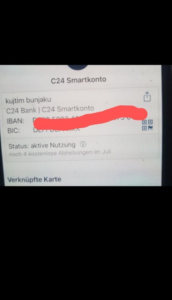
Pro ISIS linked German network “Spend in the way of Allah”divulged beneficiary account details disclosing that funds were being funnelled from the Frankfurt based C24 Bank account registered under the name of “Kujtim Bunjaku” to the ISIS families in Syria.
Many of the monitored German fundraising campaigns for smuggling out ISIS minors were comfortable with accepting payments through bank transfers, showing their hubris of slyly evading the scrutiny of their country’s financial system and law enforcement bodies for their involvement in financing terrorist activities. Even in 2020, it was revealed Germany’s biggest financial institution Deutsche Bank, despite red flags, was indirectly involved in laundering money to terrorist groups as it authorized and processed millions of dollars of suspicious transactions for its FBME client– an offshore bank in Cyprus –that was funnelling money to financiers of the Syrian regime and businessmen trading oil with ISIS and other organized criminal networks. Other German ISIS-linked networks- ‘Sisters in the Tent” and “Spend in the way of Allah” were also raising funds for the Tajik minors by first getting in touch with their well connected unregistered hawala networks in Turkey, instructing the benefactors (ISIS sympathizers) from Europe to transfer funds through Western Union to the bank account of ISIS financial facilitators that are involved in dealing with the many unlawful money transfer entities in Istanbul. In this case, the supporters were asked to transfer money to a hawala operator named ” Heysen Hemet ” in Istanbul with the stated purpose of funds transfer to be labelled with certain codewords like “Amazon” or ‘”Family help” to evade the bank’s anti-money laundering compliance mechanisms. Thus, the money that was transferred through Western Union was directly funnelled to the unregulated money transfer offices in Turkey via these financial networks based in Germany.
It is widely known and was often shared with ICSVE by ISIS detainees, that Turkey has been acting as the key financial and logistics hub for ISIS’s activities fueling its resurgence in Syria with the recently busted Turkish money service business of Alan Khanfurah, who served as a key intermediary in sending thousands of dollars to ISIS members in Syria. A recent July investigation by Nordic Monitor further highlighted the ISIS financier in Turkey from Konya province facing arrest warrants since 2013 and many terror financing charges —owing to the bureaucratic neglect and judicial oversight —continued to have unfettered access to the country’s banking system to use financial services (credit cards and debit cards) for these purposes with impunity. Treading with the utmost caution, in the wake of tightened border security measures and scrutiny over bank transactions, ISIS has refrained from dealing with traditional hawala dealers and instead uses its networks via front companies and money transfer offices registered in Turkey which have enabled swift transfers to the ISIS families in Iraq and Syria. To no surprise, lately, a pattern of daunting evidence has emerged to expose how nefarious entities and individuals continue to tap the Turkish financial system to seamlessly move, store and obscure funds for ISIS, eventually landing Turkey in the global terror financing watchdog, FATF’s 2021 grey list underling its strategic deficiencies in combating money laundering and terror financing.
Finally, on August 5, the collaborative efforts of the Russian German and Tajik channels paid off as the Russian ISIS-linked channel “It is our duty to help the Believers” announced that within 10 days, they were able to collectively achieve their target of raising $17,000 solely through these crowdfunding campaigns. The channel admin writes “Brothers and sisters, with the permission of Allah, we collected $ 17,000 for two brothers R … and Sh …. Praise be to Allah, many and many boys came out and in a safe place Alhamdulillah Alhamdulillah. We ask Allah to make it easier for other boys to leave and settle them in a safe place where it will be good for them, for Allah is the Best of the Dispersers. Amin”. This posting highlights the difficulty of delegitimizing militant jihadist efforts because until such youth are repatriated it can be argued by ISIS supporters that the boys may be living better in Idlib, reunited with their mother than forced away from her and locked in an SDF prison.
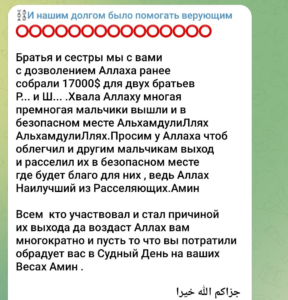
Russian ISIS-linked financial networks exuberantly shared the news on their telegram channels of successfully amassing $17000 within mere 10 days for smuggling out Tajik boys from Al-Hol

The German ISIS linked network on its telegram channel acknowledges that $7000 have been surreptitiously sent to the camps for two Tajik adolescents.
Till now, the encounters with these crowdfunding efforts hinted at the slowly shifting interest of the ISIS-linked financial networks towards raising smuggling capital for freeing the minors and women from the camps, but now this trend has been formalized by an alarming development as the 3 most active Russian ISIS-linked networks “It is our Duty to Help Believers”, “Invitation to Heaven” and “Nusbaya Bhaguz” in a long message openly declared that their financial endeavours will from now onwards be solely dedicated for freeing the women and minors and incarcerated ISIS fighters from the prisons in northeastern Syria. This means that they will no longer be catering their energies towards collecting funds for helping women afford the necessities of daily life including food, clothing, toys, etc. as they now claim this is not what they need. The new narrative peddled is that the end solution of any financial help should be tangible and that it is only by smuggling out these ISIS families from the camp that they can again win over their “freedom”. The admin writes ” We consider that the freedom of Muslims is more important and dearer, their release is obligatory according to our prescription, and the reward of this work is great and given by Allah. Truly, many families in our camps need freedom more than food and clothing! How many wounded need diagnostics and high-quality treatment or surgery? How many mothers of big boys, every night afraid that they will come and take their sons to their schools so that later they will make their warriors out of them! You can list the position of all the sisters and children for a long time, but the essence is the same – freedom is paramount. We see with our own eyes that no people are dying of hunger here”. Indeed, there is Islamic legitimacy in this shift as a key tenet of Islam is freedom and there is really little provision in Islamic teachings for imprisoning criminals even. Islam teaches that criminals are to be swiftly punished and reintegrated into society, but prison and loss of freedom are anathemas in Islam. Thus the channel correctly reiterates that the threat posed to those, who are proactively involved in money collection campaigns from the Syrian camp remain vulnerable targets with “the sword of deportation, prison sentences and separation from children dangling over their heads.”
However, there is a catch when it comes to the new fundraising goals. Not all the women who apply to these fundraisers for help will be “qualified” for receiving financial smuggling aid from these networks. The fundraisers state that only women and families who “are true to their beliefs” will be considered for getting their assurance of help in coming out of the camps. This is the same as previous support financing that required that women receiving help inside the camps be willing to marry their ISIS supporters over the Internet or otherwise profess full support for ISIS’s ideology. In their own words, “These fees will only go to those with the right beliefs. Innovators [those who attempt to change Islam], fitnah [seditionists] and all kinds of dubious people will not receive funds from the collection in any case! Therefore, an iron tazkiya [spiritual purification] is needed for every family! At the slightest deviation from the aqidah, the Sunna in the direction of heresy and the fees will be immediately directed to another family.” With some families chosen after they fulfil this ideological criterion, each of them will be closely vetted by these administrators to assess whether their talk of ideological adherence is reflected in their actions, thus, prioritizing which families “deserve” to be first smuggled out from the camps. Here even those —who pretend online to defend ISIS against the accusations of the organization being “takfiri” entering into conflicts virtually and physically with those who have publicly denounced ISIS for securing excess financial rewards from supporters will be tested if they ever approach these networks for sponsoring their release from Al-Hol. To put it simply, only those families will be financially promised to be smuggled out and who post their release serve as an asset in any capacity to the organization whether in the operational, ideological or financial realm.
A prominent pro-ISIS Russian woman, one of the admins of ” “Nusbaya Baguz” channel believed to be running the financial operations from Al-Hol obliquely spells out how they know whom to help as they are closely monitoring the actions of all women for 3 years to give them a clear picture of who are living up to their claims of being true monotheists by practising a truly pure Islamic life emulating the Salafs [companions of the Prophet] and walking on the path of prophetic “Aqeedah and Manhaj” [creed and methodology]. When asked by some supporters on the group what distinguishes hypocrites from “true “believers” to be qualified further for receiving smuggling aid, the woman in charge of the “Nusaya Al Bhaguz” network stated “being here all these 3 years already, as they say, we know every woman what she adheres to and what she strives for. A lot happened here. Constant different fitna [sedition] due to which the true beliefs and goals of different personalities were revealed. The masks fell off their faces and everything fell into place. Secondly, there is and remains a category of hypocrites, as you have noticed in your deeds. We see their deeds and do not trust them, although they reckon themselves to us. We keep such people at a distance, not trusting them with our affairs. People who betrayed or deceived Muslims cannot be from our number [from the true believers of ISIS].” This indicates what ICSVE has been noting for years now, that there are ISIS enforcers in the camp, that they have been closely observing, attempting to control and threatening the residents of the camp. These enforcers now clearly divide the women into different categories: supporters, renegades (those who are against the group) and apostates (who cooperate with the camp authorities). It appears that the contingent of the Russian female loyalists in Al-Hol might be tasked with the responsibility of the ISIS elements of choosing the right families who follow “monotheism”, that is upholding ISIS’s extremist ideology for getting access to the financial capital offered by these networks.
Other considerations for shortlisting potential families for helping them raise smuggling capital include those who are the “most needy” with having “no means to get out of captivity”, followed by individuals having underlying medical conditions and those who are on the radar of the camp authorities all prioritized in the first place. The other condition was the guaranteed support for the families, who refrained from getting into conflicts with other women over the limited available funds in a bid to secure an extra share of the economic pie for leading a better lifestyle in the camps. Women already competing over acquiring scarce financial resources is a serious concern in the camps leading to the ruffling of feathers between the camp residents as they often enter into mundane conflicts of day-to-day bickering, and altercations that might sometimes erupt into violent clashes for accessing limited resources. The last condition for securing “ransom aid” is the promise of keeping these fundraisers inconspicuous in the larger social circles of the camps coupled with the warnings of not circulating or publicizing these funding appeals with other apostate channels to avoid their Telegram channels from being flagged and taken down, counter-terrorism efforts that could circumscribe their reach and ability to solicit donations. They also make clear that all the money they have raised till now for the provision of relief aid will be fully allocated for raising ” “smuggling” fees of the new families.
Apart from securing $17,000 for Tajik minors, Russian-linked channels also posted an appeal for securing $11,000 for brokering the release of an ISIS financier who they claim was arrested again after serving his sentence in Syria for enabling mass escapes of many women from the camp for which they claim he even sold his phone. In one of Telegram’s internal chats, one administrator of the Russian-linked financial network who seems to know the prisoner personally— shared the man’s foreign identity number issued by the Republic of Turkey purportedly disclosing his identity as the 40-year-old Turkish resident of Russian origin Marat Diiarov. The donation drive started in the second week of July, and went till the third week of July according to the admins of the page, “Sadaka in the Way of Allah” which declared having raised $20,000 for facilitating the exit of the alleged ISIS member from the Syrian prison. It appears that it is mainly the Russian networks at the forefront of conducting #free the prisoner campaigns that lead to the release of women and children and male ISIS members. The Russian organizers of “Nusaiba Bhaguz” which has many administrators with one admin being a Russian woman loyal to ISIS from inside the camp, posted on August 5 that they have already started working in this direction of restricting its fundraising exclusively to “ransom collection” ( smuggling fees) with one of the glossy advertisements posted on their pages mentioning the details of the QIWI Wallet, encouraging the channel subscribers to donate for this cause personally sharing further details in the Telegram bot about the family they help plan to escape.

Prerequisites stipulated by staunch pro-ISIS network ” Nusbaya Al Bhaguz” for availing the smuggling capital provided for the families ideologically committed to ISIS’s “cause”
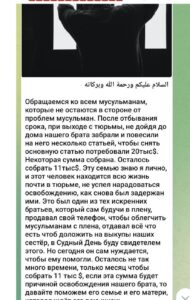
Pro Russian ISIS network “We must Help the Believers” posts an advertisement for raising 11,000 dollars for an alleged ISIS Russian finances/militant who is also a Turkish resident identified as “Marat Diiarov”
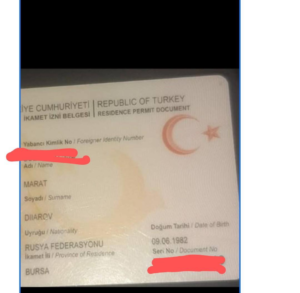
Purported Turkish foreign residency permit document of the freed Russian ISIS militant ” Marat Dirarov”
These channels back in early 2022 also widely circulated a decree issued allegedly by an ISIS Qadi [judge] in Syria that strictly prohibited revealing the faces of women and children in their photo reports where they are seen holding placards on which the name of the fundraiser and the amount is written as evidence for the channel followers to show that their donations are reaching the camps. Photographing women and children was proscribed by the Sharia judge as, according to him, it showed the women of the ummah in a humiliating position devoid of their chastity in the absence of their fully black veiled burqas. The statement read “As for photographing the sisters and their children, we do not allow this, in any way it would not be, since in these photographs there is humiliation and shame for our chaste and purest sisters. We will not accept the photographing of one of our sisters, or the photographing of the children of our brothers, even if they offer all the wealth of the earth in return.” The message ended with a” Listen and Obey” repost appeal in other channels with the message of asking other Russian administrators of the ISIS-linked channels “to observe the obligation in their channels and also prohibiting others from circulating images with women and children”. Since then, this decree has been strictly followed by many Russian networks who only share the evidence of the money collection reports with the faces of women blurred or stroked out and on cardboard mentioning the name of the fundraiser against the backdrop of their tent. Upholding the edicts of the ISIS sharia judge demonstrates at least indirect, if not direct, communication is established between these networks and official ISIS members in Syria with their unswerving loyalty to the group. Hence it’s not surprising to see that these channels have laid out specific criteria for only helping those women flee the camps who they see adhering to ISIS’s ideology manifesting in their speech and actions.
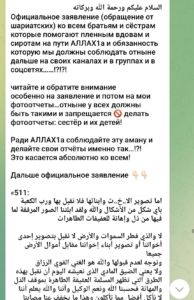
Messages circulated on the Russian-linked ISIS channels about the judgment of an alleged ISIS Sharia judge from Syria regarding the permissibility of featuring women in photos for the money collection reports that update the donors about their funds arriving in the Syrian detention camps
While factors like final destination of the location, mode of transport, transit routes, arrangement of accommodation facilities, and bribes for the intermediaries drive the smuggling costs up, many women also suggest escaping now is a risky gamble to counter the menace of ISIS threat, SDF has launched an aggressive security crackdown that has led to an increase in counter-ISIS raids, search operations, and rigorous monitoring and surveillance measures to track the movement of camp inhabitants. Further, they also shed a light on the growing trust deficit with smugglers as the smugglers renege on their promises of helping the women get out of the camps at the last moment, and for greater bribes end up sharing intelligence about the escapes with the SDF, thus exposing them to getting apprehended by the camp authorities. In an internal group chat while discussing the topic, a woman wrote “Can you imagine 19 thousand dollars from one family, children over 12 years old are also paid as adults, this is a lot of money for the Kurds, why don’t you think they would not want to have it”.
The increasing smuggling rates are not a cause of concern for those female ISIS loyalists who know that the group will pull out all stops for releasing them and their children out of the camps. Till the time they are in the camps, they also would deal with fewer problems in handling their finances as the group takes care of it all. As per accounts of those who have openly denounced ISIS’s extremist ideology, they have also paid heavy repercussions for it. They see the smuggling of minors as “usual business” for those who are still affiliated and working for the group inside Al-Hol. One anti-ISIS woman on her social media profile painfully recalls how she was brutally beaten when she publicly called out ISIS caliphs for letting the women suffer in these conditions alone (in the camp). The concerns about female ISIS loyalists ruling the camp with an iron rod are rooted in reality as ICSVE has repeatedly reported. This woman writes, “It was a year ago that I openly made a call against the daily. They almost killed me. I had more than 38 stitches on my head. They pierced my lung with a knife. I barely made it to Al Hasakha hospital. They accuse everyone they beat of spying. But the whole camp knows me and everyone knows why they beat me. I am afraid that as reprisal they can even harm children.” ICSVE has many reports where children were indeed harmed by the ISIS enforcers as well as their children used to throw rocks or hurl insults at those who have denounced ISIS.
Those disillusioned with ISIS, who claim to sever their ties with the group in internal group chats on Telegram speak of danger to their own lives as they virtually and in person have been vocal about ISIS’s deviance and its tendency of declaring excess takfir, i.e. declare as apostates, against those who don’t toe to their worldview. Indeed, women in the camps who regularly text on illicit phones to the second author state that the pro-ISIS women have drawn up kill lists for when ISIS retakes the camps to punish all those who failed to support the group. Shedding a light on this dynamic, another Russian woman, posted “There are those who support ISIS and are even ready to go to the desert with them, ready to experience hunger, bombing, ready to continue to lose their children. In a word. There are also those who, for the sake of money or out of fear, pretend to support ISIS and people like me who are against ISIS and do not hide it. Of course, we are not given the money that they [ISIS acolytes] are sent here from everywhere. We have to keep our children at home because the children of fanatics can beat our children because at home they are told that we are apostates. Nevertheless, we hold on to our opinions, we constitute around 20% of the entire camp, or maybe less.” She continued describing al Hol camp, “Most of our people live in the first district (of the muhajirat section of Al-Hol), there is little third-party ISIS, if there are such, then they are not so ardent. But in other areas, there are terrible children. I follow my daughter when she is on the street and ask her to stay home. I won’t let her be with those children. These children even hurt animals by bullying them. One of the children beat upon the belly of the dog in front of me and I was like “Is this coming and also fear what they will now learn from their fanatical mothers?” On the problems faced by the hisbah, ISIS’s religious police brigade, to continue to insist upon governing the daily life of women in the camps, another Russian woman laments “There were many cases where they were just ready to wield hammers and use knives. One was beaten because they suspected that she knew the Kurds, but this is not true. I know she is my close friend. The other because her brother works in the Red Cross organization, another because she got a lot of debts, and someone because she didn’t wear a black niqab. Someone for watching movies, someone who says something talks with sellers in the souq [market], someone for keeping a dog. they just find someone to beat”. Indeed, the female guards in these camps have also told ICSVE of being attacked and beaten by pro-ISIS women. The latest demonstration of how the kids are diligently indoctrinated by the pro-ISIS mothers was seen during the recent Eid Al Adha celebrations in the camp when the mothers jubilantly filmed their kids as they took part in the Eid Al Adha celebrations. In another case, a recent video surfaced when during the social gathering celebrating Eid girls as young as age 5 donned in black veils were seen listening to the “Dawah lessons” provided by a group of women in tents with the ISIS flag in the background.
The ISIS attack on al-Sinaa prison in northeastern Syria that freed around 300 of its comrades reflects ISIS’s continued operational capacity and resilience to pose a potential future threat to the security of the region. Alarmed by the attack, the SDF doubled down on its security measures in the Al-Hol camp through intense patrolling, search raids to hunt down ISIS-affiliated cells, and revamped security infrastructure to monitor the movements of the camp residents. Yet, the effects of such tightened security measures continue to face serious challenges and results on the ground. Al-Hol continues to be a flashpoint of ISIS violence with alleged ISIS sleepers daily targeting those who work with the SDF by providing the Kurds with intelligence about the ISIS-linked sympathizers in the camp. Their chosen methods of killing include assassinations using silencer guns, stoning to death, beheadings, and executions with the death toll of killings having reached 100 since Jan 2021. Compounding the threat posed by the IS-linked sleeper cells in the camp is another security predicament. The problem of regular escape attempts of the female ISIS members that the security apparatus is still clearly scrambling to deal with. On 3rd August the Asayish claimed to have foiled an escape attempt of 56 ISIS members including 39 children by intercepting trucks carrying escapes, followed by sweeping investigations, in which a network of dug tunnels and trenches connecting to the outer walls of the camps were discovered for allegedly smuggling goods and the residents from Al-Hol.
As accentuated, the detention centres and prisons holding ISIS affiliates in northeastern Syria guarded by understaffed SDF and Asayish security personnel whose salaries are nothing in comparison to the ISIS bribes they can be offered, house ISIS cells which serve as a source of persistent security problems. This dynamic can be further deteriorated as the SDF, surrounded by hostile forces, now scrambles to deal with the renewed threat of the Turkish military incursion into the towns of Manbij and Tal Rifat under its control in Aleppo governorate, with the possibility of drawing away security personnel from clamping down on ISIS cells and guarding ISIS prisoners to fighting against Turkish forces, harbouring an environment conducive for ISIS’s increased attacks in Syria or conducting prison breakouts. In the last Turkish incursion, an ISIS prisoner prison in Derrick suffered escapes as did the camp of Ain Issa. Further, the volatile security situation might force the international aid organizations to suspend their operations exacerbating the already humanitarian challenges faced by residents of the camp at a time when the security situation in the camp is already tenuous. This – in retrospect- is quite similar to the 2019 Turkish invasion of northeastern Syria that led to the escape of 850 detainees from Ain Issa camp as the bombs struck the camp’s vicinity. As expected, the proliferation of such crowdfunding campaigns for freeing ISIS detainees and on-the-ground fragile security environment that led to newly increasing security breaches and mass escapes from Al-Hol could easily bolster ISIS insurgency as the pro-ISIS women fugitives post their exit from the camps and could regroup forming a nucleus for ISIS cells outside the camp.
Also, there is no doubt, that a sophisticated ISIS assault on Al Ghwerian prison in January 2022 that enabled the escape of dozens of leaders to the Central Syrian desert has emboldened ISIS to carry out such large-scale prison breakouts at a time when it has maintained the momentum of waging a resilient insurgency through central and northeastern Syria. Adversaries involved in the conflict (the US-backed Kurdish-led SDF, Turkish-backed Syrian National Army(SNA) the Syrian regime allied forces backed by Russia and Iran) often acting at cross purposes, are unable to co-ordinate their counter-terrorism operations against ISIS, facilitating the free movement of ISIS militants across permeable lines of control between Al Badia and SDF held northeastern Syria, allowing the insurgency to regroup and revamp its fighting capacity. It’s unclear if ISIS still receives complicit support from Turkey but the SDF claims that former ISIS members are serving in the SNA and that many nefarious actors support them financially. Moreover, the group relies on decentralized autonomous cells spread across central and northeast Syrian provinces with the local ISIS commanders imbued with relative authority over operational matters, ensuring the longevity of its survival further making it a tall task for SDF for hunting the ISIS militants down. Likewise, Turkish assassinations via missiles leave the SDF grappling with senior leadership losses.
Lately, in the wake of the failure of Damascus’ and its allies’ counter-terrorism operations to weed out ISIS from Al Badia, the group has benefited even more from the harsh topographical conditions of vast, sparsely populated desolated desert stretches of Al- Badia desert that serves as a major logistical base for storing weapons, setting up training camps apart from facilitating their movements to and from various conflict theatres. Lately, ISIS fighters infiltrating from Al Badia into the neighbouring SDF-held province of Deir Ez-Zor and its countryside to keep up the drumbeat of their small-scale operations by significantly conducting targeted assassinations against the local SDF commanders, technocrats and religious tribal heads working with SDF and civilians alike, further denying SDF’s credibility of serving as the net security provider in northeastern Syria. Apart from targeted assassinations, ISIS-linked theft, extortions, and roadside shootings have been on the rise, with ISIS, lately not only concentrating its operations in certain parts of Deir Ez-Zor but also, bolstering its presence in the areas farther in the north in Al- Hasakah province and towards the west in the Raqqa countryside and the town of Manbij, while also aggressively recruiting the locals from Deiz-Ezzor province grappling with poverty into its ranks promising them with the salary of $150 to 200 dollars guaranteeing their livelihood. Interestingly apart from these crowdfunding campaigns that are directed towards the cause of freeing ISIS detainees, capitalizing on its terror and gory violence tactics, ISIS has financially supported its operations, by running pay-for-protection rackets. Through these rackets, ISIS has been forcing the business owners in Raqqa and Deir Ez-Zor governorates to pay protection money of up to 2000 dollars by issuing explicit virtual threats and using intimidating tactics of delivering written threats stamped with the ISIS logo at the target’s doorstep, asking them to deliver money quickly and discreetly to avoid reprisals from the group. Moreover, in the eastern countryside of Deir-Ez-Zor, some reports claim ISIS has been actively taking advantage of the fragile security situation in eastern Deiz- as the Syrian where the SDF and the regime are struggling over power control by imposing taxes on oil traders to achieve self-financing. This same tactic was used in years past by ISIS in Iraqi territory, particularly around Mosul, where the group held. With the fear of retaliation from ISIS coupled with these extortion schemes going undetected by the SDF owing to them being surreptitiously run by ISIS, the group will likely continue to thrive financially by frequently resorting to running the lucrative business of extortion rackets.
Further, the fragile security threat from ISIS is reinforced as the SDF struggles to win over and co-opt the Arab tribes from Raqqa and Deir Ez-Zor provinces as their underlying claimed grievances towards the ANNES — economic disparity and hardships in the predominantly Arab areas, claims of the use of SDF’s heavy-handed security measures towards civilians and arbitrary arrests in counter-ISIS raids, lack of the inclusion in the decision-making process — remain to be fully resolved. These grievances create an opening for ISIS for luring more men from the Arab tribes into their fold and are also exploited by the bigger enemies of the SDF who also pour funds into these efforts to splinter support from the SDF. Apart from the trust deficit between some of the Arab tribes and Kurdish-led AANES having a detrimental impact on the SDF’s long-term counter-terrorism ISIS efforts, many locals have shown apprehension further refraining from co-operating with the SDF on providing intelligence regarding ISIS cells as it would dearly cost them their lives as documented by the increase in the spate of killings of informants and other locals collaborating with the SDF committed by ISIS sleeper cells.
To make it worse, these contemporary on-the-ground debilitating security developments are accompanied by worrying concerns in the contours of IS-linked terrorism financing as the transnational Russian ISIS networks formally declared their intent and resolve of dedicating their crowding efforts solely to smuggling out ISIS loyalists from the Syrian detention facilities. For them, this means bidding adieu to their long-time promises of providing relief aid for many women in the Syrian prison camps deprived of financial support from friends and families, irrespective of their affiliation– indicating that all the funds worth thousands of dollars originally raised for providing daily assistance will be entirely diverted for spiriting out ISIS adherents from the camps. This strategic decision emanated from their many “success stories” of raising tens of thousands of dollars within the timeline of a mere 10 days as documented in the cases of raising smuggling capital of $20,000 for 2 Tajik minors and another $11,000 for the Russian ISIS financier who allegedly had helped many women to exit the camps. This is because these networks witnessed an increasing stream of funds from the ISIS supporters pouring in for the cause of freeing these pro-ISIS detainees, indicating that the majority of ISIS supporters might be deeply moved by their plight, particularly the boys who are ageing in prisons, and willing to help in smuggling out these detainees. This is backed by the observation of these fundraisers having bitterly grumbled on their telegram channels about how they receive lackadaisical responses from the supporters for the fundraising campaigns that focus on providing daily aid to women ( food, clothing shelter.)
But in the first place, one wonders how ISIS networks have been able to approach and maintain communication with their target audience by promoting their crowdfunding campaigns followed by showing the supporters the way to transfer funds through their deeply entrenched financial and logistical hubs in different parts of the world enabling the flow of funds from different corners of the world to reach the camps in Syria to aid these women. Their communication with the donors was promoted on their favourite encrypted application Telegram which didn’t take down their accounts or block their channels despite their Telegram channels having been reported multiple times. The worst part is these ISIS-linked financial networks are so ensconced in their digital haven of the encrypted app Telegram that they don’t even feel the need to mask their illicit terror funding activities as an act of legitimate charitable giving. As stated, depending on the risk factor involved in their financial networks these ISIS-linked Telegram channels bolster their digital presence by oscillating between keeping their channels public or private, facilitated by Telegram’s flexible interface that enables extremists to do everything from self-promotion to fundraising. brand development and propaganda dissemination, to secret plotting of attacks with minimal interference from law enforcement agencies. And if their accounts are even blocked, through a common interconnected Telegram channel, one might have access to the new link of these ISIS-linked crowdfunding channels within a matter of a few hours with the archived content about their fundraising campaigns posted on their newly created Telegram channel. Thus shutting down social media postings and encrypted app channels soliciting donations for financing terrorism is more challenging than one might expect. For smoothly moving funds to their destination in the camps, this study documented how ISIS-linked individuals using the unregulated nefarious money transfer/ hawala networks and exploiting the loopholes of their country’s formal financial system have managed to move, obscure and store money worth thousands of dollars for freeing the female ISIS acolytes and minors from the camps and ultimately help strengthen the group by replenishing its dwindling ranks.
As many children approach adulthood with the risk of being transferred to wartime prisons housing adult ISIS fighters in Kurdish-led SDF-controlled territory of northeastern Syria, coupled with recent efforts undertaken by various states for repatriation of ISIS children, it is apparent that ISIS-affiliated networks– especially the Russian ones – will primarily prioritize devoting their financial resources for freeing teenage boys from Al-Hol. But till that time, these boys who continue to reside in these open-air prison camps in miserable conditions will be exposed to the unprecedented intensified risk of indoctrination and radicalization by female ISIS affiliates who will attempt to instil in them the desire to seek vengeance for their fathers who were killed or were taken as prisoners during battles with the (SDF) and the American-led international coalition. With these children making their way out of the camps numbed to violence, ISIS will have a gold mine discovered in the form of tapping into the children’s ideological fanaticism required as an uncompromising stimulant for preparing them as “virtuous” future militant jihadist fighters. Meanwhile, those who are wanting to be repatriated are mainly non-ISIS supporters from the Syrian prison camps who are raising financial capital independently for smuggling themselves out from Syria to illicitly enter Turkey where they hope to surrender themselves to their countries’ embassies in the further hope of being repatriated to their homeland to face justice in their countries of origin for their time living under and perhaps serving ISIS.
Thus with each passing day, as the humanitarian and security crisis exacerbates the global terrorist landscape, there is a dire need to repatriate these women along with their children from the Syrian detention camps to face justice in their own countries without any of the women being given the option to deny the repatriation of their children. As in the absence of repatriation, children and their families will be resorting to desperate and dangerous measures to leave the camps, “including ones that put them at physical risk, acute risk of smuggling, risk of recruitment into armed groups and risk of children being pushed into forced marriages”. The prolonged stay of the ISIS-linked families in the Syrian detention camps further provides ISIS-linked financial networks with a golden opportunity to buy more time and raise more funds to free their loyal comrades from these camps and prison facilities. Escaped ISIS affiliates could bolster ISIS’s human capital strength as they could exploit the well-structured and established international smuggling networks to cross international borders to join other ISIS branches in other conflict theatres constituting international security threats with the group’s capability of planning attacks in their home countries. Depending on their expertise and the utility to the terror group the freed militants could assume the role of financial facilitators, frontline fighters, militant jihadist preachers tasked with recruiting new members, elite commanders and strategists spearheading the group’s operational trajectory further abetting ISIS resurgence in Syria with a major role played by ISIS mothers as they incubate the next generation of ISIS militants.
About the authors:
Mona Thakkar is a Junior Research Fellow at ICSVE exploring the dominant narratives and propaganda setting strategies of jihadist groups of ISIS, Hayat Tahrir Al-Sham and others through social media, as well as analyzing the impact of the ISIS resurgence and ideological clashes of militant jihadist groups on the geopolitics of the Idlib theatre, and other security-related developments in Iraq and Syria. Mona holds a Bachelor’s degree in Mass Media with specialization in Journalism. Currently, she is pursuing a master’s from Jamia Millia Islamia, New Delhi, India. She has previously worked as a West Asian foreign policy research intern at the Centre for Public Policy Research, India, and as a fixer/translator for German publications like Swiss Radio, Fernsehen and Tages Zeitung. Mona is fluent in English, German, Hindi and Arabic.
Anne Speckhard, Ph.D., is Director of the International Center for the Study of Violent Extremism (ICSVE) and serves as an Adjunct Associate Professor of Psychiatry at Georgetown University School of Medicine. She has interviewed over 700 terrorists, their family members and supporters in various parts of the world including in Western Europe, the Balkans, Central Asia, the Former Soviet Union and the Middle East. In the past five years years, she has interviewed 245 ISIS defectors, returnees and prisoners as well as 16 al Shabaab cadres and their family members (n=25) as well as ideologues (n=2), studying their trajectories into and out of terrorism, their experiences inside ISIS (and al Shabaab), as well as developing the Breaking the ISIS Brand Counter Narrative Project materials from these interviews which includes over 200 short counter narrative videos of terrorists denouncing their groups as un-Islamic, corrupt and brutal which have been used in over 150 Facebook and Instagram campaigns globally. She has also been training key stakeholders in law enforcement, intelligence, educators, and other countering violent extremism professionals, both locally and internationally, on the psychology of terrorism, the use of counter-narrative messaging materials produced by ICSVE as well as studying the use of children as violent actors by groups such as ISIS. Dr. Speckhard has given consultations and police trainings to U.S., German, UK, Dutch, Austrian, Swiss, Belgian, Danish, Iraqi, Jordanian and Thai national police and security officials, among others, as well as trainings to elite hostage negotiation teams. She also consults to foreign governments on issues of terrorist prevention and interventions and repatriation and rehabilitation of ISIS foreign fighters, wives and children. In 2007, she was responsible for designing the psychological and Islamic challenge aspects of the Detainee Rehabilitation Program in Iraq to be applied to 20,000 + detainees and 800 juveniles. She is a sought after counterterrorism expert and has consulted to NATO, OSCE, the EU Commission and EU Parliament, European and other foreign governments and to the U.S. Senate & House, Departments of State, Defense, Justice, Homeland Security, Health & Human Services, CIA, and FBI and appeared on CNN, BBC, NPR, Fox News, MSNBC, CTV, CBC and in Time, The New York Times, The Washington Post, London Times and many other publications. She regularly writes a column for Homeland Security Today and speaks and publishes on the topics of the psychology of radicalization and terrorism and is the author of several books, including Talking to Terrorists, Bride of ISIS, Undercover Jihadi and ISIS Defectors: Inside Stories of the Terrorist Caliphate. Her publications are found here: https://georgetown.academia.edu/AnneSpeckhardWebsite: and on the ICSVE website http://www.icsve.org
Follow @AnneSpeckhard

